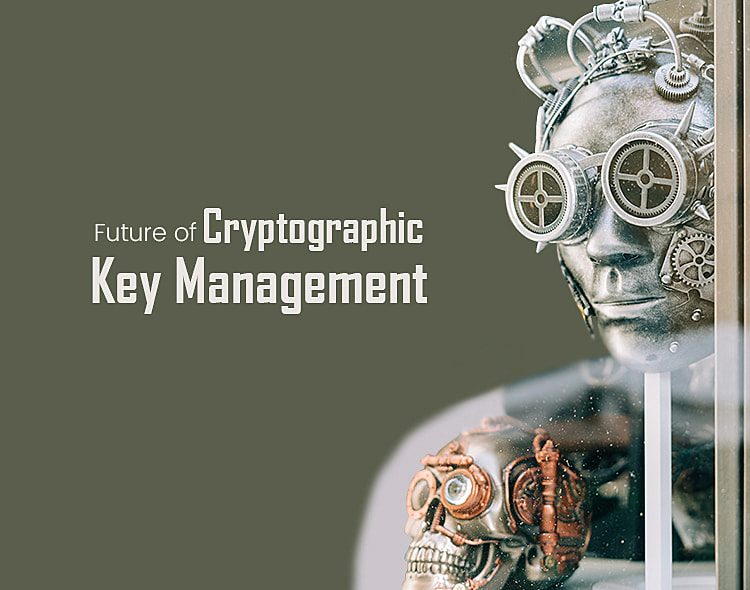The cryptocurrency market is growing at an unprecedented pace. Currently, the global market cap is over $1 trillion, with multiple public-listed companies, like MicroStrategy, holding cryptocurrency in their treasury. Along with this growth comes an increased need for security, which is why key management is so important. Cryptocurrency exchanges, wallets, and other platforms handle large amounts of money and personal information, so it’s crucial that they have robust security measures in place.
What Is Key Management?
In layman’s language, key management is the process of creating, storing, and using cryptographic keys. A key is a string of characters that has been used since its inception to encrypt and decrypt data. Cryptocurrency protocols today are primarily built upon Public Key Infrastructure (PKI) which is using asymmetric cryptography. Lack of proper key management might lead to loss of funds, and data breaches, which causes severe repercussions. The founder of one of the Canadian cryptocurrency exchanges, QuadrigaCX died led to a loss of over $215 million in customer funds only because he did not share his password.
The Importance Of Key Management
As we all know such cryptographic keys play an unmatchable role to keep our data safe and no one can break it without its proper code. Cryptocurrency exchanges, wallets, and other platforms handle huge personal data, so we can very well guess how crucial they are with robust security features in place. If a key is lost or stolen, the consequences can be severe. Like, for they could drain the exchange of all its funds. A key management system is a set of rules to generate, distribute, store, use, and destroy keys.
The 3 Parts Of Effective Key Management
1. Generating Strong Keys
One of the most important aspects of key management is generating strong keys. A strong key is one that is resistant to attack. But that takes a toll on usability. If it did not, then it is likely, not secure. For a key to be strong, it should be random and convoluted enough that it would be infeasible for an attacker to guess. Therefore, clients normally end up with a long private key which they typically store in unsafe places like hard drives, diaries, or mobile phones. There are a plethora of methods that can be used to generate strong keys, such as:
Random number generators: RNG is a device that generates numbers randomly which can be alloted to cryptographic keys.
Entropy sources: It is a source of randomness which can be used to create cryptographic keys. Entropy sources include noise from an electronic circuit and the movement of a computer mouse.
Hashing algorithms: It is a mathematical function that takes input by producing an output and could be used to create cryptographic keys.
Read: Most Trending Crypto Wallet Of 2023 – Phantom
2. Storing Keys Securely
After generating keys, they need to be stored with full security. For big enterprises, keys are often stored on centralized servers. In the case of single users, the go-to solution is on-device storage. By storing keys on the device, the entity is able to give custody to the asset owner. There are a variety of methods that can be easily used to store keys securely, such as:
Hardware security modules: It is a physical device storing cryptographic keys by performing cryptographic operations in a tamper-resistant environment.
Secure enclaves: It is a hardware-based security measure isolating cryptographic keys from the rest of the system. Secure enclaves are used to store keys in a safe environment.
Key vaults: It is a software-based security measure storing cryptographic keys in a safe way that cannot be easily hacked.
3. Allowing For Easy Recovery Of Lost Or Stolen Keys
Key recovery is a tough nut to crack in cryptography since the password cannot be reset if forgotten unlike happening in web2 applications earlier. If a users key gets lost they will lose access to their digital assets. As much as 3.8 million BTC are lost forever owing to the loss of keys. This number was also supported by Unchained Capital after they used a different model to estimate. This is close to 20% maximum BTC circulation. Therefore, redundancy is crucial for effective crypto key management. If a key is lost or stolen, it should be possible to recover. There are many methods that can be used for allowing easy recovery of lost or stolen keys, such as: backing up keys (such as an HSM or a secure enclave) or using a key management service.
Current Innovations In Key Management
Keyless signature schemes: A signature without the use of any key scheme allows the verification of digital signatures without the need for a cryptographic key. This shall mitigate the risk of key compromise.
Quantum key distribution: QKD is a method to distribute cryptographic keys which uses quantum mechanics and is more securer than traditional key-based methods.
Future of Key Management
Hackers are constantly developing new methods to hack cryptographic keys, and AI developers and data scientists are constantly into future innovations in key management which is likely to focus on increasing security to improve its usability and reduce its costs. As we put our shoes into a privacy-focused future, we do expect next-level innovation in the domain of key management protocols. We need something good yet simple. Scientists should care more for their user’s security and privacy and be much more careful in the way they manage keys.
Read: A Global Map Of Cryptocurrency Regulations
[To share your insights with us, please write to sghosh@martechseries.com]
